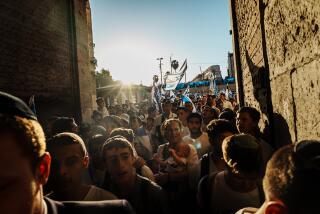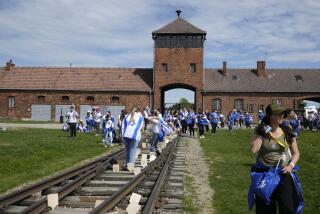John Paul Laments the Horrors of Holocaust
JERUSALEM — Sealing his legacy as a crusader against anti-Semitism, Pope John Paul II bowed before Jewish ashes Thursday during an emotional visit to Israel’s Holocaust memorial and told Nazi death camp survivors that the memory of the slaughter “burns itself onto our souls.”
“No one can forget or ignore what happened; no one can diminish its scale,” the Roman Catholic leader said at a haunting ceremony in the cavernous Hall of Remembrance of the Yad Vashem memorial. “We wish to remember. But we wish to remember for a purpose--namely, to ensure that never again will evil prevail.”
His categorical and at times poetic message fell short of the apology that some Jewish leaders had demanded for the failure of his World War II-era predecessor, Pius XII, to speak out during the extermination of 6 million European Jews.
Instead, John Paul uttered a sweeping lament “as bishop of Rome,” assuring the Jewish people that his church “is deeply saddened by the hatred, acts of persecution and displays of anti-Semitism directed against the Jews by Christians at any time and in any place.”
Israeli Prime Minister Ehud Barak hailed the presence of the white-clad pope, seated at his side before the memorial’s eternal flame, as the climax of a “historic journey of healing” between Christians and Jews.
“Here, right now, time itself has come to a standstill,” Barak said. “This very moment holds within it 2,000 years of history. And their weight is almost too much to bear.”
Tommy Lapid, a Holocaust survivor and member of Israel’s parliament, said, “One may argue that the pope should have expressed remorse” for the Vatican’s silence, “and I regret that he did not.” But the pope’s statements were “of the utmost importance,” he added, especially in a Europe with pockets of rising xenophobic nationalism. “It would simply be impossible for any Catholic to deny the Holocaust now.”
Rabbi Eric H. Yoffie, president of Reform Judaism’s Union of American Hebrew Congregations, agreed that the pope’s words were moving, saying, “I believe that Jews everywhere were touched by the ceremony and by his words, which so clearly came from his heart.” But, referring to Pius XII’s public silence, he said in Worcester, Mass., “I simply cannot understand the failure of the pope to speak out.”
Soon after this landmark in Jewish-Catholic relations, the pope witnessed a painful display of enmity between Muslim and Jewish leaders, who quarreled at an interfaith encounter over an issue standing in the way of Middle East peace--whether Jerusalem is the capital of Israel or any future Palestinian state.
But it was mostly a day of triumph for the ailing 79-year-old pope, who became the first priest since 1583 to say Mass on the presumed site of the Last Supper. He was showered with gifts from Israel’s two chief rabbis and President Ezer Weizman, who summoned Israeli dignitaries in John Paul’s honor for the second time since his arrival Tuesday and called him a leader with a “mark and influence on history.”
Outreach to Jews Marks a Breakthrough
John Paul, who witnessed the Holocaust as a seminary student in his native Poland, made history early in his 21-year reign by inspiring Catholic resistance that helped bring down communism in his homeland and across Eastern Europe. But his outreach to Jews is a breakthrough of equal magnitude in a church that only 35 years ago officially repudiated the mind-set that Jews were responsible for the death of Jesus.
In 1986, he became the first pope to set foot inside a synagogue, and eight years later the Vatican established diplomatic relations with Israel. A groundbreaking Vatican document two years ago recognized that centuries of church teaching about Jews had numbed Catholics into passivity during the Holocaust. The Catholic catechism revised under John Paul’s papacy declares anti-Semitism a sin.
Israel’s government has embraced this first official papal visit to the Jewish state as a high-visibility affirmation to the world not only of John Paul’s bridge-building record but also of Israel’s own legitimacy.
The warm official welcome has not been matched by public enthusiasm. Unlike the jubilant crowds that turned out Wednesday in Palestinian-run Bethlehem when their leader, Yasser Arafat, greeted the pope, most Israelis reacted with indifference--and a few with hostility.
The pontiff’s movements in Jewish West Jerusalem on Thursday drew tiny knots of onlookers--including about a dozen Jews who rallied at the Holocaust memorial to denounce the wartime Catholic Church as a Nazi collaborator. As the pope met the chief rabbis, Catholic and Jewish leaders defied an invitation to mingle and sat on opposite sides of the room.
For a third day, John Paul heard rival claims to Jerusalem from his Israeli and Palestinian hosts. While endorsing the Palestinians’ quest for an independent Palestinian homeland, the Vatican, like most states, recognizes neither side’s claim to Jerusalem; it favors an international protectorate over the city to safeguard the holy sites of Christians, Muslims and Jews.
Barak pleaded his case at the Holocaust memorial, reminding the pope of Israel’s commitment to religious property rights and freedom of worship.
Yisrael Meir Lau, chief rabbi of Israel’s Ashkenazi Jews, rose during the interfaith assembly to claim that the pope’s pilgrimage here meant “recognition of Jerusalem as [Israel’s] united, eternal capital.”
Someone in the audience shouted that the pope had never made such a statement.
The assembly, at a Catholic educational center, was intended as a nonpolitical gathering in a city where such conflicts often turn violent.
But the rabbi’s claim prompted a finger-waving harangue from the next speaker, a Muslim cleric named Sheik Taysir Tamimi. In ringing tones, he demanded an independent Palestinian state, the return of Palestinian refugees to their homes and the release of Palestinians from Israeli jails.
Tamimi, deputy chief justice of the Palestinian Islamic courts, walked out before the meeting ended.
Many Arab Muslims and a few Christians cheered the sheik’s speech, while Jews and most Christians sat in silence. “Such radicalism can spoil the efforts to make peace,” Michael Wolpe, whose children’s choir sang for the pope, told the audience.
The pope, who listened to the sheik’s remarks in Arabic through an interpreter, had no visible reaction and did not change his prepared remarks.
“Not everything has been or will be easy in this coexistence,” John Paul acknowledged. But if the Holy Land’s three monotheistic religions can work in harmony, he said, “Jerusalem will truly be a city of peace for all peoples.”
The pope got a taste of Jerusalem’s religious standoff in the bare medieval chamber marking the presumed site of the Upper Room, where Christ consecrated bread and wine before his apostles on the eve of his crucifixion. The room, now a secular state-run memorial, has the trappings of a mosque, a legacy of the Ottoman takeover. Jews claim the room below as the supposed tomb of King David.
John Paul prayed alone for 25 minutes in the chamber before declaring at Mass: “In a sense, Peter and the apostles, in the person of their successors, have come back today to the Upper Room.”
But the day’s most powerful image was from Yad Vashem--a solemn ceremony that brought John Paul face to face with death camp survivors and other elderly European Jews, some of whom wept in his presence. Israeli state television carried the 80-minute event live.
Entering slowly with the aid of a cane, the pope paused to look at the names of 20 death camps engraved on the black tile floor. At the eternal flame, he pulled a lever that intensified the fire and stood before it in silence, his face reflecting the orange glow.
A cantor sang a prayer for the souls of martyrs, and John Paul greeted six featured survivors--one for each million Jews who died in the Nazi gas chambers and crematories.
“In this place of memories, the mind and heart and soul feel an extreme need for silence because there are no words strong enough to deplore the terrible tragedy of the Shoah,” the pope said, using the Hebrew word for the Holocaust. “We are overcome by the heart-rending laments of so many.”
Hope of Apology for Wartime Record Dims
John Paul and Barak endorsed joint efforts by Christians and Jews to eliminate prejudices against each other. “It is impossible to overcome all the pains of the past overnight,” Barak said.
John Paul’s speech appeared to close the door on any hope of an apology from the aging pope for Pius XII’s wartime record. John Paul has credited Pius’ quiet diplomacy with saving some Jewish lives and favors his candidacy for sainthood. The pontiff’s speech Thursday looked to the future as much as it looked back.
“Can we ignore them, erase those same years that are in conflict?” asked Danny Naveh, a senior official of Israel’s opposition Likud Party. “There was an additional opportunity here, which was missed, in which the pope could have dealt with and even expressed regret over the behavior of the church in those days.”
Israel’s government has urged the Vatican to put off consideration of Pius’ beatification--the first step toward sainthood--for 50 years while scholars examine the church’s wartime record. President Weizman urged the pope Thursday to open secret Vatican archives on that era.
More to Read
Sign up for Essential California
The most important California stories and recommendations in your inbox every morning.
You may occasionally receive promotional content from the Los Angeles Times.










